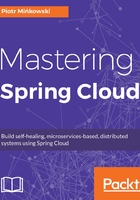
Summary
I have guided you through the process of single-microservice development, from a really basic example to a more advanced, production-ready Spring Boot application. I have described how to use starters to enable additional features for the project; use the Spring Web library to implement services that expose REST API methods; and then we moved on to customizing the service configuration using properties and YAML files. We also saw how to document and provide specifications for exposed REST endpoints. Next, we configured health checks and monitoring features. We used Spring Boot profiles to adapt the application to run in different modes and, finally, we used ORM features for interacting with embedded and remote NoSQL databases.
It's not an accident that I have not mentioned anything about Spring Cloud in this chapter. You just can't start using Spring Cloud projects without basic knowledge and experience in working with Spring Boot. Spring Cloud provides many different features that allow you to place your service inside a full microservice-based ecosystem. We will be discussing these functionalities one by one in the following chapters.